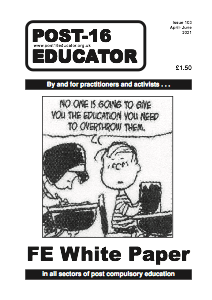Post-16 Educator
by and for practitioners and activists . . .
Post-16 Educator
by and for practitioners and activists . . .

Post-16 Educator is a quarterly magazine produced by and for activists in all sectors of post compulsory education.

General Studies Project
Set up in July 2013, the Project aims to recapture the experience of those involved with Liberal Studies, General Studies and General and Communication Studies.
If you were a lecturer in this field, and/or you’re in touch with someone who is or was, and you’d like to be involved in this research, please contact us at this email address.
To all UCU and other union branches with an interest in further, adult and higher education, the magazine is a 24-page quarterly produced entirely by and for practitioners and activists in these sectors
If your branch would like to arrange a subscription, please contact the editor on cwaugh1@btinternet.com and let us know how many copies you would like, whether you would want a PDF of each issue etc, and we will get back to you with a suggested subscription rate. For individual or regular individual subs go to Subscriptions.
The Real Radical Education?
Liberal and General Studies with vocational students in UK colleges 1950-1990 as revealed through interviews with practitioners who taught it.
Bulletin 1: origins; purpose; context October 2017
Bulletin 2: history; aims; legacy November 2018
A Post-16 Educator occasional publication
Latest Post-16 Educator
Issue 103, April to June 2021
Introduction
FE: its past, present and possible future
Betraying another generation
Another round of vocational qualifications won't create better jobs
The FE White Paper, an immediate reaction
A monocular perception
FE White Paper another wasted opportunity
Trade Union Education and the White Paper: true lifelong learning
Responding to the White Paper – role of the private sector
VET, post-secondary education – a new settlement?
Educating the future electorate
Whither political education in the face of cultural hegemony?
Articles, photos etc. wanted:
The editors welcome articles by and/or for practitioners and intending practitioners in any area of post-16 education, especially by women, plus letters, news items, materials and illustrations. Articles can be published without the author’s name if desired. Contact us at post16educator@runbox.com

About PSE
The Editorial Board
The editorial board consists of grass roots activists from UCU and the NUT working together to organise readers and contributors into a national network that is democratic, that develops our practice and our thinking, and that equips us to take action over issues rather than always having to react to changes imposed from above.
The editors welcome articles of any length by and/or for practitioners and intending practitioners in any area of post-16 education, especially by women, plus letters, news items, photographs, materials and illustrations. Articles can be published anonymously if required.
PSE
There are several real debates going on in post-16 education at the moment. Practitioners need to engage in these debates before decisions get made. Post-16 Educator covers all the major issues in the post-compulsory sector.
Each bi-monthly issue includes news and commentary from those working within post compulsory education, plus regular contributions from other interested activists. Comprehensive news coverage picks up on reports in national and local media, together with academic and government papers relevant to the sector. Recent features have included the Israeli academics boycott, prisoner education, teaching practice and the recently formed University and College Union (UCU).
Subscriptions
Any individual or organisation can subscribe. Annual rates (4 copies) range from £3.00 (unwaged) to an institutional rate of £25 each year. Please click here for details of subscriptions.
Subscribe to PSE
In addition to the free online content, you can subscribe and support PSE and receive 4 paper copies each year from only £3. Click here for further details.




ONLINE DISCUSSION: PSE Meeting Professionalism 2
Our contested professionalism
Lesson Observation - top-down or democratic control
Wednesday May 26th: 6.30-7.30
Zoom link: https://us02web.zoom.us/j/81289421066?pwd=Rmg0TjYycWZUQS9KR2dTR09LdHgrUT09
Discussion with: Professor Matt O'Leary (Author of 'Classroom' and researcher on lesson observation and teacher professionalism)
& Nina Doran (FE Teacher Educator / member of UCU National Executive Committee)
Our second discussion on teacher professionalism focuses on Lesson Observation and similar mechanisms. Along with so-called Learning Walks and TLA Reviews, Lesson Observations so often cause frustration and disengagement but with little positive effect on what we do. Yet, observation can be a tool for genuine professional learning; evaluating practice can be more than a perfunctory post-observation confessional!
In this discussion, we're interested in the experience of observation and similar practices of both those who are observed and those who do the observing.
•How are these mechanisms used to regulate and limit teachers?
•What part might they play in a genuinely teacher-controlled, collegial, pedagogically-enriching professional learning? Are there examples in the sector we can learn from?
•And importantly, how can teacher activists mobilise around these issues in the interests of a democratic professionalism?

POST-16 EDUCATOR HAS MOVED TO www.post16educator.org.uk
If you’ve visited us before you may beed to clear your browser’s cache:
In Google Chrome: Chrome/Clear browsing data
In Firefox: Firefox/Preferences/Privacy and Security/Cookies and Site Data/Clear Data
In Safari: History/Clear History
Contact: post16educator@runbox.com
